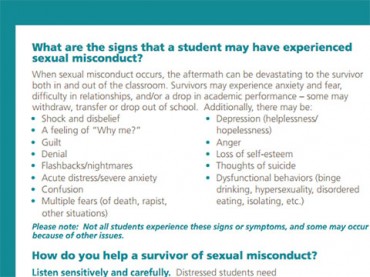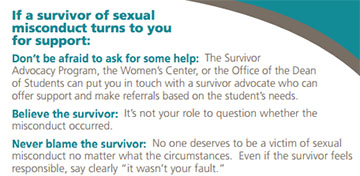
ANALYSIS
In an effort to help faculty and staff provide useful information to students who report sexual assaults to them, Ohio University is encouraging them to side with alleged victims before an investigation has even started.
The school has also shut out a student group whose express purpose is to defend students accused of violating campus rules.
The school is distributing file folders to faculty and staff that are pre-printed with guidelines to “assist students who report sexual misconduct.” The folders guide recipients “through the next legal, mental and procedural steps” involved in reporting assaults, The Post reported.
Some of the language in the folders, though, seems to presume an accused student is guilty.
The folders use the term “survivor” 28 times to refer to students who make accusations, a common term for advocates of lower evidentiary standards in campus rape investigations. The university has an official “Survivor Advocacy Program” as well.
 On one page, the folder tells faculty and staff to “believe the survivor” and “clearly” tell the accusing student that “it wasn’t your fault” even if the student “feels responsible” in some way.
On one page, the folder tells faculty and staff to “believe the survivor” and “clearly” tell the accusing student that “it wasn’t your fault” even if the student “feels responsible” in some way.
The page lists a dizzying array of vague signs that an accuser “may have experienced sexual misconduct”: denial, confusion, depression, anger, shock and “dysfunctional behaviors” such as binge drinking and “hypersexuality.” In a disclaimer, the page notes some of these signs “may occur because of other issues.”
Asked if the language was presumptive, Dean of Students Jenny Hall-Jones acknowledged that the language was an issue and was debated. Ultimately, however, “We decided to use the term ‘survivor’ because yes, as faculty and staff who are there to provide support/resources, we are assuming that the person is telling us the truth,” she said in an email to The College Fix.
“These folders are for your average staff member who is not trained in investigations nor would be a part of any investigation.”
The folders also discourage faculty or staff from asking questions about the circumstances surrounding an alleged incident.
That’s because “[o]nce the report is made from a faculty/staff member, it goes to our Office of Institutional Equity,” Jones said, and then that office and “our conduct office conduct a joint investigation of the incident.” At that point, all sides involved are questioned.
 Students Defending Students, a wing of the student senate that defends students accused of disciplinary offenses at no cost – and which sued the university this summer for punishing its speech – helped students in sexual assault cases through last year.
Students Defending Students, a wing of the student senate that defends students accused of disciplinary offenses at no cost – and which sued the university this summer for punishing its speech – helped students in sexual assault cases through last year.
After 2013, “the process changed – advisers for those specific cases are specially trained students, faculty and staff,” Director Katlyn Patton told The College Fix in an email. “We have not dealt with cases under the new process due to this division.”
Ben Eilers, assistant director of Students Defending Students, told The Fix in a phone interview that the university didn’t want students to bear the pressure of handling sexual-assault cases. He added that students can still go through a program to be trained as “advocates” for those accused of sexual misconduct.
The folder’s “survivor” language is repeated on the “Community Standards” page of the Division of Student Affairs website, though it also confusingly refers to “victims and survivors.”
The school’s investigation process flow chart shows how complicated the process can be.
A more detailed flow chart explains that once the Office of Institutional Equity believes there is reason to continue an investigation, investigators conduct interviews and then issue a pre-hearing report.
The school seems to encourage accused students to admit guilt, however. Following the pre-hearing report and a “pre-hearing meeting,” the accused student can “accept responsibility,” which will preempt a hearing heard by a “two person panel of professionals.”
College Fix reporter Matt Lamb is a student at Loyola University-Chicago.
Like The College Fix on Facebook / Follow us on Twitter
IMAGES: Ohio University screenshots




Please join the conversation about our stories on Facebook, Twitter, Instagram, Reddit, MeWe, Rumble, Gab, Minds and Gettr.